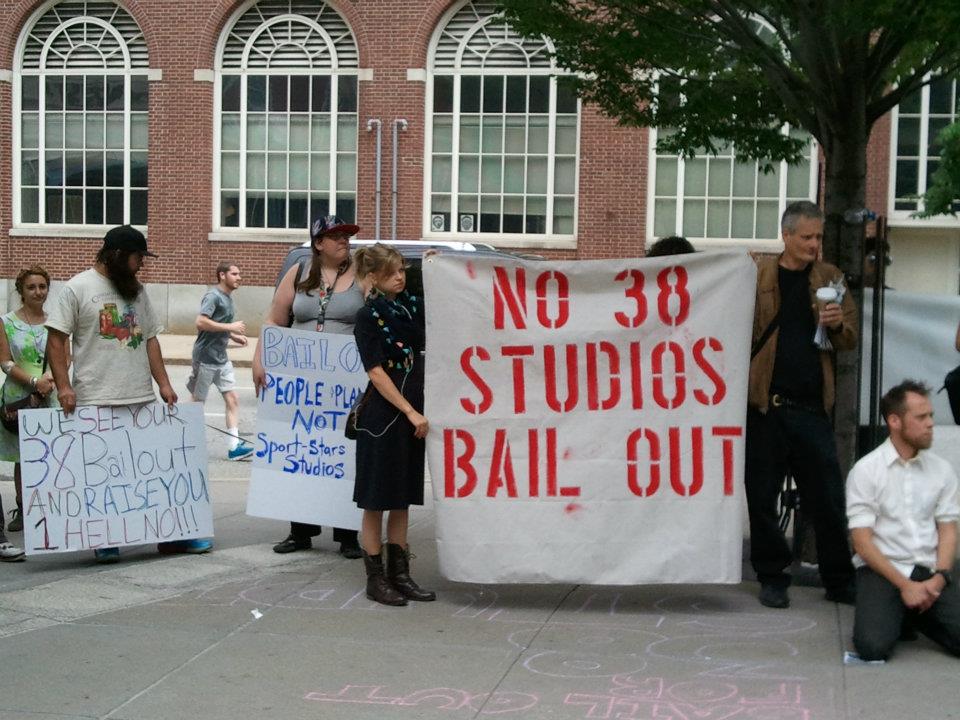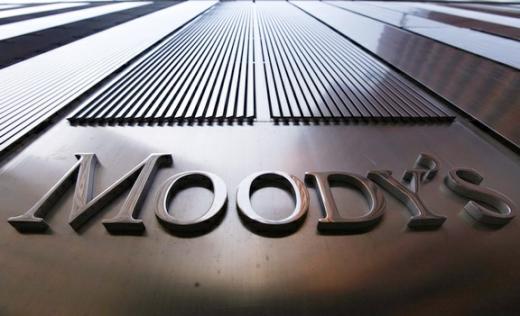 Moody’s (the Wall St. ratings agency) has downgraded the R.I. Economic Development Corporation bonds that funded 38 Studios; and has issued further warnings that the rest of Rhode Island’s bonds are under review, what WPRI’s Ted Nesi called a “sharp rebuke” to the state. The threat is loud and clear: fail to pay bondholders for 38 Studios, and we will damage your credit. In this way, it fulfills prophesies that Wall Street would look to make an example out of Rhode Island should the state not pay back the bondholders.
Moody’s (the Wall St. ratings agency) has downgraded the R.I. Economic Development Corporation bonds that funded 38 Studios; and has issued further warnings that the rest of Rhode Island’s bonds are under review, what WPRI’s Ted Nesi called a “sharp rebuke” to the state. The threat is loud and clear: fail to pay bondholders for 38 Studios, and we will damage your credit. In this way, it fulfills prophesies that Wall Street would look to make an example out of Rhode Island should the state not pay back the bondholders.
But the downgrade is nonsensical, and mainly continues to demonstrate why trusting ratings agencies remains a terrible idea in this post-economic crisis world. The New York Times‘ quantitative geek Nate Silver pointed this out when Standard & Poor downgraded the United States’ credit rating: ratings agencies are very bad at predicting what will happen, which is ostensibly what a rating should be. The credit rating on the 38 Studios bonds should’ve already reflected the likelihood that the state would default on that debt; if anyone had bothered to do due diligence, it would’ve been very clear to Moody’s that that was a real likelihood.
First, 38 Studios CEO Curt Schilling was unable to secure investment from private investors, making him dependent on this cash. Second, anyone analyzing what he was attempting (building a World of Warcraft-killer) would’ve absolutely known it wasn’t likely to work out (not unless Schilling was going to switch products once he secured the $75 million from the state, and he wasn’t). Third, the deal was highly unpopular with the people of Rhode Island, meaning that in the event of a 38 Studios collapse, there would be pressure on politicians not to pay. Fourth, the state is in recession, meaning there would be increased pressure not to pay. All of these risks should have been built into the rating when the bonds were issued and thus we shouldn’t be seeing a downgrade now (the greater risk was built into the bonds via greater interest payments).
Of course, though, a smart investor would’ve seen all this and refused to touch these bonds. But the ratings agencies aren’t for smart investors, they’re for stupid investors that are easily fleeced (see; subprime mortgage crisis ratings). Which is why stupid investors will be taken in by the likely downgrade of R.I.’s general obligation debt. From a pure facts on the ground position, a downgrade there doesn’t make sense. Let’s see what Moody’s is suggesting could downgrade our debt:
* Failure to honor its legal or moral obligations to bondholders
* Mounting combined debt and pension liability burdens with no plan to address them
*Deterioration of state’s reserve and balance sheet position
* Persistent economic weakness indicated by lack of employment recovery when the rest of the nation rebounds
*Increased liquidity pressure reflected in narrower cash margins, increased cash flow borrowing, or a shift toward tactics such as delayed vendor or other payments to gain short-term liquidity relief
*Continued significant reliance on one-time budget solutions, particularly deficit financing
*Resolution of pension litigation in employees’ favor
So, Moody’s doesn’t distinguish between moral obligation bonds and general obligation bonds, making it a very unsophisticated ratings agency indeed. No one, anywhere, has suggested not paying back our general obligations. Moody’s though, prefers to dupe investors by suggesting that’s an actual possibility.
The rest is basically jargon for typical Wall Street priorities: cut the budget, cut pensions, don’t run deficits. Got it. Don’t worry, our lawmakers are mostly with you, Moody’s. Oh also, our employment issues. Well, luckily for idiot investors, our employment rate has been steadily dropping. Of course, that’s partly because many people are leaving the workforce, but such semantics shouldn’t bother a wise and all-knowing credit ratings agency like Moody’s. After all, it’s the stats that matter.
The really sad problem with all of this is that even though ratings agencies are for idiots by idiots, there’s nothing we can do about it right now. Until such a time as a ratings agency for ratings agencies comes along, a vast herd of investors will treat what a ratings agency says as Very Important, even when a ratings agency is dead wrong. Moody’s colleagues at S&P figured their downgrade of Treasury bonds would raise rates, instead it sent the safest investment opportunity in the world to record lows as frightened investors poured money into the U.S. Treasury.
These investors took a risk on the 38 Studios bonds, a risk they should’ve understood. They gambled and they lost. Some Rhode Islanders have suggested that these gamblers shouldn’t pocket anything for their failure. Moody’s has decided that means that all of Rhode Island’s debt is possibly a riskier investment than it initially thought. Why? Perhaps it’s because Moody’s seeks not to honestly rate the credit worthiness of particular instruments, but to influence policy. In which case, they appear to be in a good position to do so.
 Part of the revised FY2014 budget passed by the House Finance committee last night includes the first payment ($2.5M) to cover the 38 Studios’ default. This payment will not actually be made until May, 2014.
Part of the revised FY2014 budget passed by the House Finance committee last night includes the first payment ($2.5M) to cover the 38 Studios’ default. This payment will not actually be made until May, 2014.







